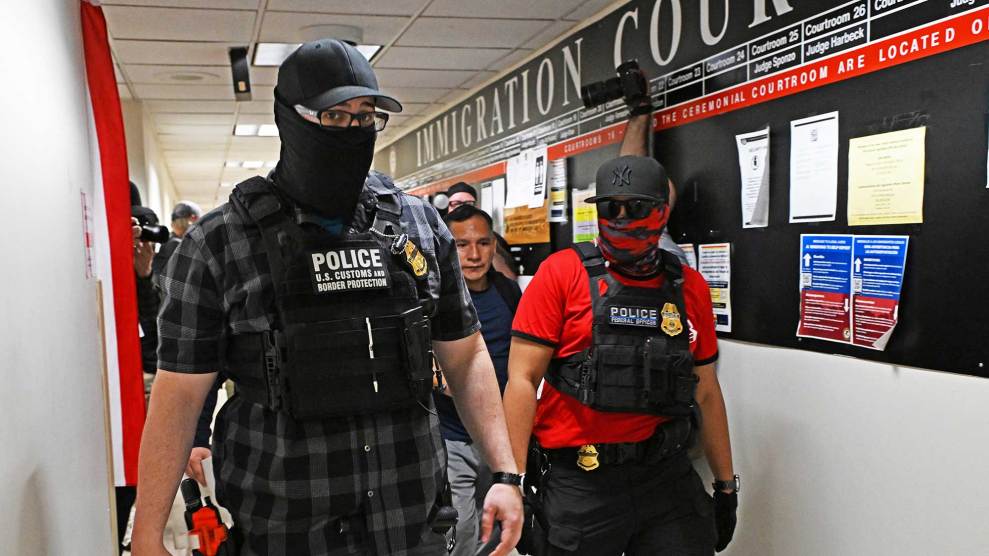
Andrea RENAULT / Star Max
When it passed the One Big Beautiful Bill Act in June, Congress handed nearly $75 billion to Immigration and Customs Enforcement. Some $30 billion of that money will be spent on enforcement and deportation—hiring spree incoming—and another $45 billion will go toward new detention centers, including 50 by the end of the year.
The OBBB immediately supercharged President Donald Trump’s mass deportation campaign, which already had been terrorizing immigrant communities and sending asylum seekers to a hellish prison in El Salvador. But an important part of the detention state ramp-up has flown under the radar: ICE’s increased cooperation with local law enforcement agencies.
At the end of the Biden presidency, ICE had just 135 287(g) deals in place; now there are 1,001—a 641 percent increase.
On Friday, ICE hit a new milestone: The agency has now signed more than 1,000 so-called 287(g) agreements nationwide. These agreements, which deputize local police and jails to perform certain immigration enforcement functions, have exploded under Trump. At the end of the Biden presidency, ICE had just 135 287(g) deals in place; now there are 1,001—a 641 percent increase.
About half of these agreements are what ICE calls task force agreements, which allow state and local cops to essentially act as immigration agents while fulfilling their regular police duties. If these sound familiar—and familiarly problematic—it’s because they were discontinued in 2012, following a Department of Justice investigation the year before that found widespread racial profiling by Maricopa County Sheriff’s Office, then led by the notorious Joe Arpaio. The Trump administration brought task forces back this year, and ICE has signed more than 500 of these particular agreements across 33 states.
As my colleague Laura C. Morel wrote in July, Florida has led the way in signing 287(g) agreements, as part of its larger push to be a leader in Trump’s deportation efforts (see also: the Alligator Alcatraz tent city). In fact, state legislators even passed into law a bill that requires county jails and the sheriff’s offices running those facilities to participate in 287(g). Local advocates told Laura they were worried about what all this would mean for immigrant communities across Florida:
Growing cooperation between ICE and police in Florida will affect the day-to-day lives of immigrant families. “It’s not just about [an immigrant asking]: ‘What happens if I have to have an interaction with a police officer in some sort of criminal context?’” Greer says. “Living your life and existing in this community is now an extreme risk to being able to come home and see your kids, being able to come home and see your family. It is incredibly frightening.”
State cooperation with federal immigration authorities can lead to “rippling harm” on the communities that police are meant to serve and protect, says Shayna Kessler, director of the Advancing Universal Representation Initiative at the Vera Institute of Justice. “It increases distrust in law enforcement. It increases fear in immigrant communities, it decreases the ability of immigrants to take care of their families, to support the economy, and to be strong and stable members of their communities.”
The federal government is already pumping billions of dollars into Trump’s anti-immigration crackdown, unleashing masked agents all across America. But in many places, undocumented immigrants will now also have to worry that any encounter with a police officer could lead to their deportation.














